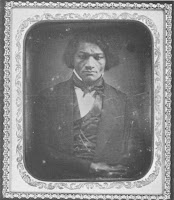“My mistress was, as I have said, a kind and tender-hearted woman; and in the simplicity of her soul she commenced, when I first went to live with her, to treat me as she supposed one human being ought to treat another. In entering upon the duties of a slaveholder, she did not seem to perceive that I sustained to her the relation of a mere chattel, and that for her to treat me as a human being was not only wrong, but dangerously so. Slavery proved as injurious to her as it did to me. When I went there, she was a pious, warm, and tender-hearted woman. There was no sorrow or suffering for which she had not a tear. She had bread for the hungry, clothes for the naked, and comfort for every mourner that came within her reach. Slavery soon proved its ability to divest her of these heavenly qualities. Under its influence, the tender heart became stone, and the lamblike disposition gave way to one of tiger-like fierceness. The first step in her downward course was in her ceasing to instruct me. She now commenced to practice her husband's precepts. She finally became even more violent in her opposition than her husband himself. She was not satisfied with simply doing as well as he had commanded; she seemed anxious to do better. Nothing seemed to make her more angry than to see me with a newspaper. She seemed to think that here lay the danger. I have had her rush at me with a face made all up of fury, and snatch from me a newspaper, in a manner that fully revealed her apprehension. She was an apt woman; and a little experience soon demonstrated, to her satisfaction, that education and slavery were incompatible with each other.” —African-American abolitionist, reformer, and memoirist Frederick Douglass (1818-1895), Narrative of the Life of Frederick Douglass, An American Slave (1845)
Several reasons led me to use this quote from
Frederick Douglass, arguably the most significant African-American before
Martin Luther King Jr.: Black History Month, this week’s History Channel
“Lincoln” documentary (in which Douglass played an important role), and the sheer dramatic power inherent in this scene.
But above all, I wanted to highlight the role of
newspapers in the African-American struggle for freedom.
The more pious slaveowners, like the plantation
“mistress” in the first of Douglass’ three autobiographies, might be willing to
teach slaves how to read the Bible. But even this practice became more limited by
Southern legislation after Nat Turner’s Rebellion in 1831.
Plantation owners feared that their slaves would take
literacy one step further to search out newspapers that would not only lead
them to think for themselves but also to exchange information that could help
overthrow the “peculiar institution.” (Indeed, the reaction of Sophia Auld, wife
of Douglass’ master, was so harsh because she discovered him in this
clandestine activity.)
But psychologically speaking, another concern could
have been lurking: the thought that, if a slave could master a discipline
entirely limited at this time to whites, it would immediately undercut the
belief in racial inferiority used to justify slavery (and, later, segregation).
Today, black newspapers face many of the same
challenges that their white-owned counterparts do—notably, the increasingly daunting
economics of fielding a print product in the digital age, and the popular
belief, propounded by a prior President, that the press is “the enemy of the
people.”
But, just as these papers’ longtime role as the voice
of their people should not be forgotten, so their future as an information
alternative for the same group should not be abandoned.
Douglass’ own experience with owning three newspapers
illustrates the importance of such alternatives and the difficulties in
maintaining them for the long term. His service as editor and part-owner of the
New National Era in the early 1870s proved such a money pit that swore off ever
to be involved with the media again.
But, no matter how negative an impression he came away
with, Douglass had during that time proved a key national voice during the
Reconstruction Era—and his departure left a vacuum just when white America was
starting its retreat from equal rights for freedmen.
More significant, when he founded the abolitionist
paper The North Star in Rochester in 1847, thrust to the forefront the
victims of slavery, in the belief that “that the man who has suffered the wrong
is the man to demand redress,—that the man STRUCK is the man to CRY OUT—and
that he who has endured the cruel pangs of Slavery is the man to advocate
Liberty.”
The black press continued to press the nation to pay attention through long, lonely years when many white politicians and even journalists, when they did not incite hatred against them, acted as if they were invisible. (That might explain why the former President named above could say--puzzlingly using the present tense, as if the object of his praise were still alive--that Douglass was "an example of somebody who’s done an amazing job and he’s being recognized more and more, I noticed.”)
In today’s Bergen (NJ) Record, Jim Beckerman paid
tribute to Douglass, anti-lynching crusader Ida B.Wells, pioneering editor T.
Thomas Fortune, and other luminaries in his article on “How the Black Press Changed America for the Better.”

No comments:
Post a Comment